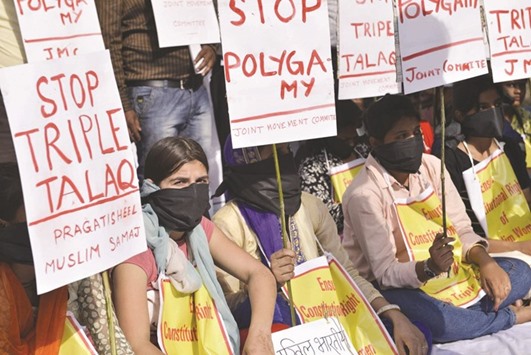A five-judge constitution bench of the Supreme Court will today begin hearing on a plea that triple talaq, nikah halala and polygamy “violated Muslim women’s rights” to equality and dignity and are not protected by the right to profess, practice and propagate religion under Constitution’s Article 25(1).
The bench comprising Chief Justice Jagdish Singh Khehar, Justice Kurian Joseph, Justice Rohinton Fali Nariman, Justice Uday Umesh Lalit and Justice S Abdul Nazeer is likely to hear the matter for seven days.
The hearing is rooted in the October 16, 2015 order of the apex court by which it had directed the separate listing of a petition addressing the question of rights of Muslim women vis-a-vis the three customs.
The government has already told the court that the three “violated the Muslim women’s right” to equality and dignity and were not protected by Article 15(1) of the Constitution guaranteeing freedom of religion.
Meanwhile Jamiat Ulama-i-Hind president Maulana Syed Arshad Madani opposed what he said was judicial interference in Muslims’ religious affairs and said a solution to the triple talaq issue should be found outside the court.
“Instead of court interference in religious affairs (of Muslims), the issue should be discussed between Islamic scholars,” he said.
He said the higher judiciary should put forth its objections to triple talaq before the religious scholars and ask them to find a solution to the contentious issue.
“The court can have objections to certain points; it should ask us to find a solution. If the Supreme Court can say that the issue of Babri Masjid (in Ayodhaya in Uttar Pradesh) should be resolved outside the court, why not this (talaq) issue be solved by the ulemas (Islamic scholars)?” he asked.
Madani said: “If they are able to find a solution, then it is good... and if they cannot, the court doors will still remain open.”
The Jamiat leader said neither the minority community nor others should play politics on the issue.
“I am surprised that Prime Minister (Narendra Modi) is saying that Muslim women are being meted out injustice. Isn’t this politics? This is also politics. You are doing politics over Muslim issues,” Madani said.
Citing a survey, he said there were more divorces among Hindus than Muslims in the country.

Members of the Pragatisheel Muslim Samaj stage a demonstration against triple talaq at Jantar Mantar in New Delhi yesterday.
